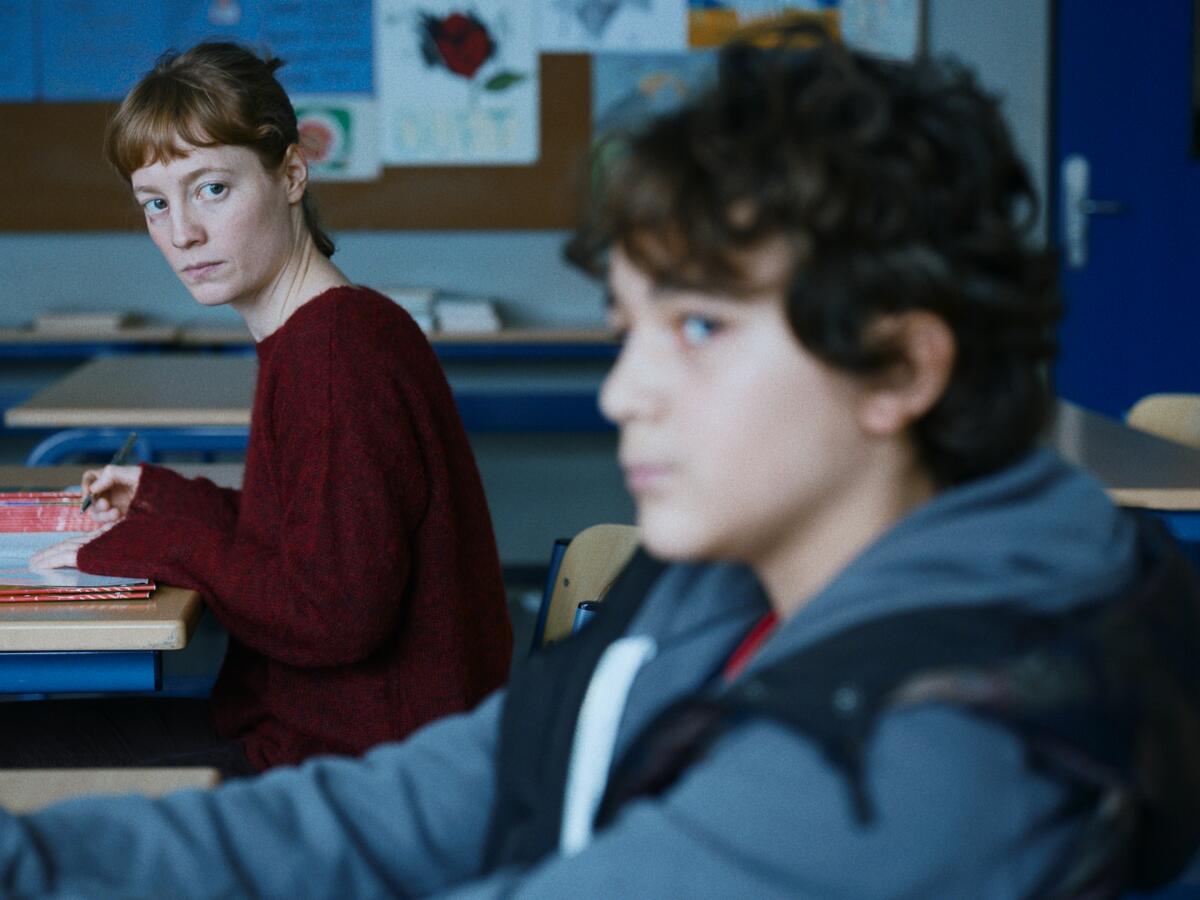Review: In nail-biter ‘The Teachers’ Lounge,’ an educator discovers the limits of justice

Suspicion has poisoned the middle school where Ms. Nowak (Leonie Benesch) has been teaching for a few months. Her admirable dedication to engaging with students and striving for fairness prove insufficient when a seemingly minor scandal upends her class.
Bristling with tension, “The Teachers’ Lounge,” Germany’s current Oscar contender for international feature, places the educator at the center of a barrage of accusations and demands from colleagues, administrators, parents and even the school’s student-run newspaper. Ilker Çatak, a German writer-director of Turkish descent, has shrewdly crafted a taut and tight examination of the concept of justice folded into an absorbing character study.
“The rules apply to everyone,” Ms. Nowak, who always prioritizes her pupils’ well-being, states right before a discovery forces her to interrogate the rigidness of her moral compass. Money has been stolen from her wallet, left in the presumed safety of the teachers’ lounge. The petty crime is only one in a string of reported thefts that has tarnished the reputation of an innocent student, Ali (Can Rodenbostel), the son of Turkish immigrants.
There’s a propulsive energy to how cinematographer Judith Kaufmann shoots Benesch walking with purpose through the school’s ample halls. That pep in her step, however, is always paired with Marvin Miller’s barbed score, alerting us to trouble brewing. Video evidence of the real culprit’s identity indirectly affects Oskar (Leonard Stettnisch), a quiet, math-inclined boy in Ms. Nowak’s class and a staff member’s son.

Known for her role in Michel Haneke’s “The White Ribbon,” Benesch’s carefully calibrated performance traverses a wide range of emotions: We see her genuine satisfaction in teaching, as well as the wounding shock when her intentions are misconstrued. Çatak expertly deploys a single instance of magical realism that materializes the guilt-driven turmoil within her. Equally as impressive is how young Stettnisch can command our attention playing Oskar with little dialogue, mostly armed with a piercing, inculpatory stare.
His increasingly volatile behavior (including inciting classmates to disrespect Ms. Nowak) is a response to what he believes to be a cruel mischaracterization of a person close to him. Çatak’s not-so-clear-cut affair hinges on the fact that Ms. Nowak, acting almost with saintly resolve, won’t give up on him.
Given her tireless conviction to always follow protocol and do what’s “right,” she becomes visibly frustrated when her colleagues make flagrant assumptions and dismissive remarks about the students. But can one totally blame the other teachers for their lack of patience? So much is expected of them, as the group responsible for turning kids into functional individuals. The fact that everything we see transpires within the walls of this ordinary institution — we don’t get a window into Oskar’s home life — points to the limitations of what those in the education system, even the truly dedicated ones like Ms. Nowak, can do for young people in distress.
If “The Teachers’ Lounge,” as riveting as it is enraging, aims to teach any lesson, it may be one aimed at parents who entirely outsource their children’s development to understaffed and overburdened educators. Çatak is less concerned with the factual truth of who did what and why, and more interested in the extent to which Ms. Nowak can actually support Oskar, even if her suspicions of what happened could actually be correct.
Sometimes, though, the conventional pursuit of justice often leaves behind collateral damage — a sad truth that everyone, including well-meaning teachers, could use a refresher course on.
'The Teachers' Lounge'
In German and Turkish, with English subtitles
Rating: PG-13, for some strong language
Running time: 1 hour, 38 minutes
Playing: In limited release Dec. 25; Laemmle Royal, West Los Angeles
More to Read
Only good movies
Get the Indie Focus newsletter, Mark Olsen's weekly guide to the world of cinema.
You may occasionally receive promotional content from the Los Angeles Times.










